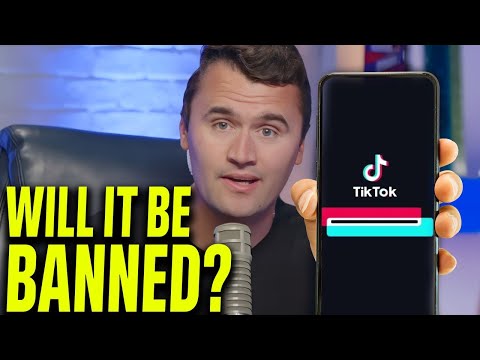**The TikTok Tango: An App, a Ban, and a Political Conundrum**
As the clock ticks down to January 19th, a date that looms ominously in the world of social media, discussions about the potential ban of TikTok are heating up. It’s not just a matter of swiping through funny cat videos or trendy dance challenges any longer; the ban is now tied up with political maneuvering and national security claims. It seems that everything from youth engagement to foreign influence is at stake, and Donald Trump appears once again at the center of a digital storm.
TikTok, often viewed as a platform favored by the younger, more left-leaning crowd, has surprisingly become a battleground for conservatives. A curious twist in the narrative reveals that many young people who wouldn’t typically align with Trump found themselves receiving his messages on TikTok. This method of direct engagement was hailed as innovative—connecting with those who might not have otherwise taken notice of the political landscape. It turns out that this app, often dismissed by some as a mere outlet for TikTok dances, was serving as a conduit for political discourse.
However, the backstory of this impending ban takes a rather ironic turn. In the past, TikTok has been painted as a “propaganda tool” of the Chinese Communist Party (CCP), causing a right-wing uproar over national security. Yet, many see the current push to ban it as a maneuver arising from the Democrats’ discomfort with the app’s growing popularity among young conservatives who challenge their viewpoints. So why are they concerned? It seems that when TikTok’s influence begins to sway public opinion in a direction they dislike—specifically concerning foreign policy—a knee-jerk reaction to suppress it arises.
Now, let’s not forget about the larger implications that this proposed ban presents. Giving the government the power to decide which social media platforms citizens can use sets a peculiar precedent that many conservatives are understandably wary of. The reality is that if the federal government can declare TikTok off-limits, what’s to stop them from shutting down or banning any app that doesn’t align with their agenda? In a world where free speech stands tall, the idea of censoring information based on political disagreement begins to resemble the types of governmental overreach that previous generations have fought to prevent.
While TikTok captures the headlines, there’s another name gaining traction—Tulsi Gabbard. Speculation about her appointment as Director of National Intelligence is stirring up conversations about a true overhaul of intelligence agencies that some say have gone astray. Gabbard, a vocal critic of these agencies, could bring much-needed transparency, accountability, and maybe even trust back into their operations. The prospects of decent people in such high positions of power could yield significant shifts in future national policy, especially concerning the military engagements driven by questionable intelligence reports.
In conclusion, TikTok’s impending ban and Gabbard’s potential rise could define the political landscape in ways that are seriously unexpected. The TikTok situation includes not just social media dynamics but the larger narrative of freedom of expression, while Gabbard’s possible appointment hints at a desire to re-align the intelligence community with the needs and desires of the American people. It’s a classic case of “what’s old is new again,” where the battlefield has transformed from highways to hashtags. As we navigate these uncertain waters, one thing is clear: the outcome of these events will be a telltale signal of America’s political and social evolution, leaving everyone eagerly awaiting the next episode in this ongoing saga.



